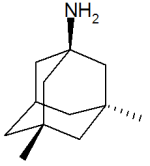Memantine
Memantine is the first in a novel class of Alzheimer's disease medications acting on the glutamatergic system. Memantine was developed by Merz and licensed to Forest for the U.S. and Lundbeck for selected European and international markets. Memantine is marketed under the brands Axura and Akatinol by Merz, Namenda by Forest and Ebixa by Lundbeck. more...
Pharmacology
NMDA receptor
A dysfunction of glutamatergic neurotransmission, manifested as neuronal excitotoxicity, is involved in the aetiology of Alzheimer's disease. Targeting the glutamatergic system, specifically NMDA receptors, offers a novel approach to treatment in view of the limited efficacy of existing drugs targeting the cholinergic system. (Cacabelos et al., 1999)
Memantine is a low-affinity voltage-dependent uncompetitive antagonist at glutamatergic NMDA receptors. By binding to the NMDA receptor with a higher affinity than Mg2+ ions, memantine is able to inhibit the prolonged influx of Ca2+ ions which forms the basis of neuronal excitotoxicity. The low-affinity of memantine, however, preserves the physiological function of the receptor as it can still be activated by the relatively high concentrations of glutamate released following depolarisation of the presynaptic neuron.
5-HT3
Memantine acts as an uncompetitive antagonist at the 5HT3 receptor, with a potency similar to that for the NMDA receptor. (Rammes et al., 2001) The clinical significance of this serotonergic activity in the treatment of Alzheimer's disease is unknown.
Clinical use
Indications
Memantine is indicated for the treatment of the symptoms of moderate to severe Alzheimer's disease. (Joint Formulary Committee, 2004; Rossi, 2006)
Memantine has been associated with a moderate decrease in clinical deterioration in Alzheimer's disease. (Rossi, 2006) A systematic review of randomised controlled trials found that memantine has a small positive effect on cognition, mood, behaviour, and the ability to perform daily activities in moderate to severe Alzheimer's disease, but an unknown effect in mild to moderate disease. (Areosa et al., 2005)
Memantine is also being tested for depression, glaucoma, and neuropathic pain.
Adverse drug reactions
Memantine is generally well-tolerated. (Areosa et al., 2005) Common adverse drug reactions (ADRs) include: confusion, dizziness, drowsiness, headache, insomnia, agitation, and hallucinations. (Rossi, 2006) Less common ADRs include: vomiting, anxiety, hypertonia, cystitis, and increased libido. (Joint Formulary Committee, 2004)
Read more at Wikipedia.org



